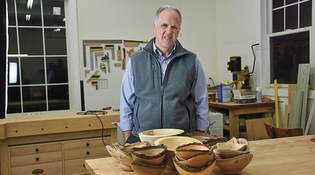 loading
loading
Light & VerityNew provost will be a "student of Yale"Scott Strobel is a biochemist and a versatile administrator.  Mark Zurolo ’01MFAView full imageSince arriving at Yale in 1995, Scott Strobel, now the Henry Ford II Professor of Molecular Biophysics and Biochemistry, has taken on a series of administrative roles: chair of his department; vice president for West Campus planning and program development; deputy provost for teaching and learning; and vice provost for science initiatives. Now, in his highest-profile assignment yet, Strobel has been tapped by President Peter Salovey ’86PhD as Yale’s new provost—the university’s chief academic and budgetary officer—succeeding Ben Polak, who is returning to the economics faculty. Strobel grew up around science, playing in the lab of his father, a plant pathologist at Montana State University. (“I was probably doing stuff you shouldn’t really let a kid do in a lab,” he says.) He obtained his undergraduate degree in biochemistry from Brigham Young University, earned his doctorate at Caltech, and did postdoctoral work at the University of Colorado. The other major influence in his early years: membership in the Bozeman Hawkers, his high school’s speech and debate team. “Being on that team transformed who I was and what I realized I could do,” Strobel says. “It’s where I became comfortable in front of a classroom and in public settings.” Strobel’s dedication to the classroom is evidenced by the several Yale and national awards he has won for teaching and mentoring. He also oversaw the creation of Yale’s Poorvu Center for Teaching and Learning, accessible to everyone in Sterling Library. Its glass walls, he notes, “are a reminder that teaching is a public experience that should be shared in a community of scholars.” When Strobel first moved into administration, he continued teaching his award-winning Rainforest Expedition and Laboratory course, a spring-term and summer undergraduate biology class that took Strobel and his students to the South American rain forest to analyze microorganisms they found in plant tissues. Eventually, he stopped teaching to focus on administrative responsibilities, including transforming a vast former pharmaceutical research complex into Yale’s West Campus, which now houses seven interdisciplinary institutes as well as the School of Nursing. (In his off hours, he has turned his wood-turning hobby into a business: he makes bowls and pens with wood salvaged from trees on the Yale campus that have been removed because of overgrowth, disease, or construction.) When his appointment was announced in November, Strobel set a goal of meeting with every dean and speaking to as many faculty members as possible to better understand the totality of the university, pledging to be a “student of Yale” as well as one of its leaders. And he’s not willing to give up teaching entirely: he plans to guest-lecture next spring in Donald Engelman’s Biology, the World and Us, an introductory science course for nonscience majors. “Being offered a position at Yale 25 years ago was a dream come true,” Strobel says. “I hoped it would be an institution where my two passions of teaching and research were fully integrated. I am deeply grateful to President Salovey for the trust he is placing in me to help shape Yale’s future, and to determine how best to use its resources to help improve the world.”
The comment period has expired.
|
|